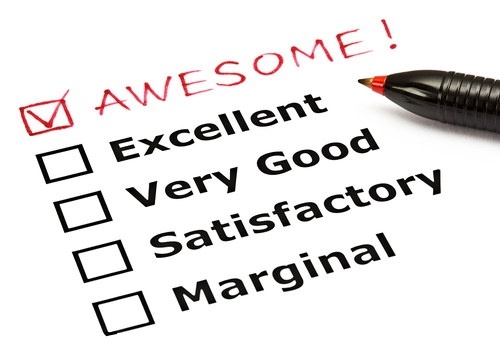Your entire business is made up of systems of one kind or another. That’s how you get things done. However, the quality of your business systems and processes will determine whether your customers love you, whether your employees enjoy and excel at their work, and whether your business rewards you with a generous profit.
So, how might others see your company? Go ahead and grade your business systems using the criteria below.

Low-Grade Business Systems (Sorry, but these will only earn you a “D”)
- Undocumented processes, word-of-mouth training (“If it’s not in writing, it’s not a system!” Michael Gerber, E-Myth Revisited)
- Rudimentary systems invented by workers on the fly
- Frequent changes to procedures as people come and go
- Crisis management, “seat-of-the-pants” solutions
- Tradition—“It’s the way we’ve always done it”
- Excessive employee discretion—“the enemy of order, standardization and quality” (Theodore Levitt, Marketing For Business Growth, 56)
- Frequent frustration, lost customers, employee turnover
- High defects, returns, rework and wasted time
- How others may see you: disorganized, unreliable, unstable
Medium-Grade Business Systems (Score yourself a “C” or a “B”)
- Some documented processes with policies, procedures, forms, checklists, etc.
- “Common sense” and “trial-and-error” solutions to problems
- Software programs (business systems in a box)
- Attention to quality control, inspection, audit, approval
- Fewer than 3% defects, defect removal process, waste management
- Normally smooth-running business operations
- How others may see you: organized, credible, professional
High-Grade Business Systems (This is what it takes for an “A” on your core systems)
- Ongoing and updated documentation on how work is done (including handling of details and exceptions)
- Knowledge and implementation of best practices
- Focus on exceeding customer expectations—the WOW! factor
- System ownership, accountability, and reporting
- Standards of performance, measurement, and feedback
- High-performance results (high-quality + high-speed = low cost)
- Prevention of mistakes, defects, and delays
- Continuous learning, improvement, and innovation
- Results-driven culture of excellence
- Maximized profitability and growth
- “Franchise prototype” (Michael Gerber, E-Myth Revisited)
- How others may see you: exceptional, industry leader, the envy of competitors
Culture of Excellence
What kind of business systems and processes do you want from your doctor, accountant, auto mechanic, or home-improvement contractor? You want high-performance systems, right? Well, that’s what your customers want from YOU!
When you focus attention on creating effective business systems, you will build a culture of excellence and enjoy the resulting financial payoff. There is no other way!







